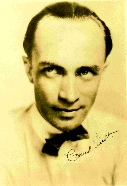
The Conrad Veidt Society
His Nickname is 'Connie'
And that is but one of the revelations unearthed by this interviewer in her visit to Conrad Veidt, one of the screen's most sinister personalities.
This vague and terrifying half-
A sinister shadow -
To supplement his broken English, Paul Kohner, Universal executive, had agreed to lunch with us.''
''His nickname is 'Connie,' '' Paul lazily informed me.
Scarcely had I recovered from that, when the car stopped before the one old-
Finally I snapped out of it and asked how, why and wherefore.
''I play such characterizations, because zey haff drama,'' he said. ''I must haff
ze dramatic, ze ecstatic -
In a two-
''Such characters haff drama, because zere iss always tragedy somewhere. Zey are bad, because somebody has made zem bad. Life has twisted zem. To find out why, and to show it why, as you play zat character doing evil, zat iss drama.
I found Veidt a most interesting man, for numerous reasons. While I did not expect
to see quite the grotesque figure of his screen self, giving due credit to make-
His lightness of movement, and his grace, are surprising in a man so large. His voice, rumbling into the reverberations of a drum, suddenly softens to the delicacy of a whisper. Big brown hands are everywhere in wide, sweeping gestures, panoramic in the circumference of their expression. When English failed, as often it did, and before Paul could supply the interpretation of his gutteral German, his tense eyes, or quick pose, would tell me his meaning.
His eyes are of that blue which, with concentration, become almost slate gray. His
power lies in them. He is thirty-
Mrs. Veidt, also German, was not in. Their little girl was asleep. The three of us
dawdled over luncheon in the old-
Though he has made but two pictures here (actually three. Beloved Rogue, A Man's Past, and The Man Who Laughs Web editor) , he has already created a stir. His fame, based on his eleven years of stardom in German pictures, had preceded him. He is regarded with such respect that his opinion is actually adhered to! He has been, and according to promise probably will continue to be, less restricted that other imported actors.
Usually a foreigner is selected not only for his skill, but because of some individual
quality -
More astonishing still is the fact that Universal, a company concerned with getting out pictures quickly, to fulfill public demand, should be so considerate of a foreigner's point of view. Veidt's two films, A Man's Past and The Man Who Laughs have offered him the type of characterizations with which he is most familiar.
''Nein, I haff no trouble.'' he said. ''Zey giff me stories I want. Paul Leni directs me in my second picture. He directs me abroad. Would zey not giff me my way, I would not act.''
A curious thing about him is that he has made less effort to Americanize himself than have most other foreigners. He is intensely enthusiastic about some American things, and is doing his best to learn English. It is simply that he is so completely European. He seldom appears in Hollywood social life, but is present at the teas and dinners of the foreign colony, the Germans and Hungarians.
''I am nineteen. My fadder iss high honor-
Wide mouth split in a grin, his eyes waited with brimming joy for me to get the humor
of that.. ''Beeg bow tie, hair like zis,'' he mussed it, swept out his hands in a
dramatic pose. ''Great dramatic actor, artistic! Beeg, booming Faust. He says to
teach me for six marks lessons -
One day he says Max Reinhardt takes ten to train. It iss a school, but you do not pay. Ach could I? It vas a dream. I go to Reinhardt. He is short, fat, man, much dignity. Vat do I act? Faust, surely! I talk like a gun. He pays no listen. I act on. He looks at me. I feel one inch beeg. He says in voice so low, so sweet, so slow, 'Now ve vill haff somesing else.'' For long time I act. Zen he says, 'I sank you. Go now.' Next day my teacher tells me I am to act wiss Reinhardt, and for pay! In marks, ten dollars a month!
Vait! Guess vat I do? I haff me printed white cards in gold letters to say, 'Conrad Veidt, Max Reinhardt Theater'. All first ten dollars for my gold cards!
For two years I am like you say extra. Zen I am in war. Zere too I am extra! Back
t Reinhardt for two years more. One day I sink he forget me. I wonder how can I make
him know me some more. I copy like our star says his lines, and Reinhardt says, 'So!'
He remembers, and giffs me a leetle bit, but it iss one of soze ectastic sings.''
Every muscle rippled feelingly, seemingly, to ber crushed by his clenched fist. ''It
attracts attention. Zen my name really means somesing -
Reinhardt, naturally, is one of his enthusiasms. ''He iss great. He haff soul, heart, chenius!'' Veidt beat an exclamatory hand against his chest.
There followed eleven years of screen stardom for UFA and other companies.
Barrymore sent for him to play in The Beloved Rogue. While here he met Paul Kohner, who persuaded Universal to sign him, after he had gone back to Germany and returned again to the country.
Whether or not his peculiar, tense performances will become popular here, remains
to be seen. Certainly he has a compelling personality, and were he ever forced to
play what we term straight leads, he would give to them a new vigor. As long as they
permit him to do the things he loves, we shall have those strange, forceful characters
to relieve the monotony of our own more-
By Myrtle Gebhart
Unknown magazine, 1928-